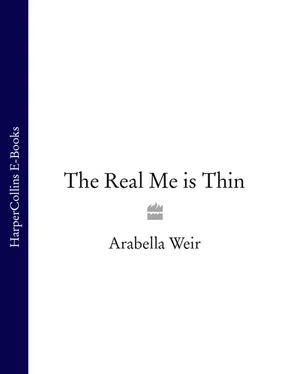So that’s how it’s done, I thought, and followed suit. I thrust my hand into the beast and successfully landed some food on my plate. It was delicious: the meat was tender and moist and the rice perfectly cooked. (I later discovered it was camel and that the jellied balls, which I didn’t sample, were cooked camels’ eyes.) I was hungry and ate some of the okra and flavoured rice happily, too. It was then, for the first time, that I looked up and around at the other guests. The entire company was staring at me. Every single male face was staring at me in astonishment. (In keeping with tradition there were no women present, since the women ate separately from the men – my presence being a gracious concession to Dad.) I couldn’t fathom what I’d done to warrant their reaction. Soon, noticing that I seemed to have drawn everyone’s attention, Dad looked round at me. Seeing my dirtied hand, he smiled and whispered into my ear, ‘You’re eating with your left hand; that’s the hand they wipe their bottoms with. Most of them will never have seen a girl eat before, and they probably think you haven’t got very nice manners.’ I made a ‘sorry’ face to the assembled men, which mercifully was met with some kind smiles and a few laughs. Even then Dad wasn’t cross with me.
In fact, this period of living alone with Dad is the only time in my life I can remember him not nagging me about my eating habits and my size. It’s occurred to me, since becoming an adult, that this might have been because he was low and lonely at the time, and was therefore less inclined to criticise me for something that, after all, didn’t matter that much – certainly not as much as a disintegrating marriage. Maybe depending on me and enjoying my company meant that he was less inclined to be constantly noticing what was wrong with me.
Dad and I returned to London together in the summer of 1969 for a family holiday. I also had to start secondary school later that September. Thereafter I’d see him in bursts when he was home on leave, for visits, outings, slightly grim meals in cheap caf$eAs – the typical things estranged dads do with their kids. But in our case it was even more fractured because Dad, as it turned out, wasn’t going to live in Britain again until 1974. Estranged dads are bad enough, but longdistance ones, especially in an era of poor or non-existent phone lines and no email, are much worse. From then on I had what you might describe as an on-off relationship with Dad where, it transpired, there was little room for bad times. Seeing Dad very rarely, I soon learnt that best behaviour was expected at all times. There was no tolerance for Bad Fat Me – only Good Thin Me was welcome.
Happiness is a warm scone
During all these early years of upheaval, disapproval, and the growing sensation that I wasn’t ‘good’ enough, there was always Granny She-She, my mother’s stepmother. Despite living in Scotland, miles away from London where we now lived, she had a hugely reassuring effect on me.
Every single time I bite into a slice of bread spread with raspberry jam I’m hurtled back into the freezing, stone-floored larder in Granny’s house in Melrose. I’m standing close by her as she puts the last touches on the scores of jars she’s just filled with her home-made jam. She covers each differently shaped jar, accumulated over the years, with carefully cut circles of greaseproof paper secured in place with a rubber band, followed by circles of remnants of faded material. Each one is then tied tight with old bits of ribbon she’s saved. On the top goes the handwritten label: ‘raspberry jam’, and the year. The jam’s still warm and glass around the tiny bit of space between the top of the liquid and the lid steams up. The jam’s been made in a ‘jam pan’ using raspberries Granny picked on her daily walks in the countryside around her house, Eildon Bank. ‘There we go, all done,’ Granny says, stepping back from the cold stone draining-board that fills the back larder, now covered with jam jars of all shapes and sizes. She puts her arm around me, gives me a loving squeeze, and I draw in that familiar smell of Granny – slightly musty Chanel No. 5, combined with many-times-washed lambswool. Adored and adoring Granny She-She, the first relative to show me unconditional love.
My mother’s mother, Eilidh, died when my mother was only 18. The story my mother told was that her mother ‘let herself die’ once she and my grandfather had retired from the boys’ school they ran, apparently saying she had ‘nothing to live for without her boys’. At this distance it’s hard to know how accurate an account that is. But whatever the circumstances of her mother’s death, it’s fair to say that my mother, an only child, had always felt unloved and untreasured by her parents.
Mum was brought up in the school – St Mary’s, a boys’ prep school of about 60 pupils – in Melrose, a pretty Borders town around 35 miles south of Edinburgh. The school had been established by her mother’s father in an attractive, large house with generous grounds.
By the time Mum was born in 1926, the running of the school had been handed over to her parents, and she was born in the house. It was a boarding school, and most of the boys saw their parents infrequently, since they lived either in colonial outposts or on remote farms too far away for even weekly visits. Mum’s parents took the view that the boys’ needs, particularly emotional ones, took precedence over those of their only child, the thinking apparently being that her parents were on hand whereas these boys had ‘no mummies’.
Shortly after her mother’s death, my mother went to university while her father went travelling to recover from his loss. When he returned he married a childless local woman, Sheila Fairbairn, who acquired a stepdaughter in my mum, whom she cherished right from the start, calling her ‘a gift’. And so it was that when Mum had kids, Sheila became, naturally, our Granny She-She, the abbreviation formed by her niece, who’d been unable to pronounce her proper name. Mum’s dad died in 1958, but Mum stayed close to her stepmother for the rest of her life. This was easily done, since Granny was the most generous-spirited, loving person imaginable. She was warm, cuddly, and physically affectionate – something that we, aside from during those few early years spent in Innes’s care, were not accustomed to. However, she harboured a dark secret, the evidence of which she kept closely guarded – so closely that I only found out about it after she died.
As a family we usually holidayed in Scotland, incorporating dutiful visits to both our grannies. First to Granny Nancy’s, Dad’s mother in Dunfermline (where we stayed as short a time as possible since she was so difficult and unfriendly), and then on, much more willingly, to Granny She-She’s. Later on, from when I was around nine years old and with different school holidays from my brothers, Mum would send me up to Granny’s alone.
It is those treasured times I recall best. My mother would put me on a coach at Victoria Station, nervously asking a random old lady if she’d keep an eye on me. An interminable 11 hours later Granny would pick me up in Galashiels, about 4 miles from Melrose, which was the closest the bus stopped to Granny’s small town. Coaches were very slow in those days and didn’t have toilets on board. Given the cost of coach travel compared to trains, it stood to reason that virtually all the passengers were OAPs, meaning the driver was required to stop every ten minutes for what was graphically announced over the tannoy as a ‘toilet visit’. Only the excitement of seeing Granny made the journey tolerable – that, and the knowledge that the kindly old lady into whose care I’d been entrusted would, upon seeing the meagre supplies Mum had given me, take pity on me and share her sandwiches with me or, better still, cake. Those old ladies always had cake – perhaps not the best cake, but cake is cake, especially to a child for whom cake has recently become off limits. Even half a slice of stale Battenburg was always gratefully received.
Читать дальше












